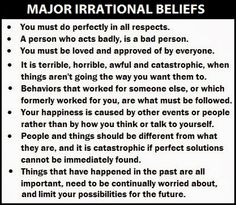Am I just a "born worrier"?
Posted on Jan 04, 2018 by Richard
A "born worrier" is a term often assigned to people who are suffering from Generalised Anxiety Disorder. It is unfair to burden people with this term as no one is born and destined to live their lives in this way. Anxiety can be successfully treated so the sufferer can learn to manage it and live a more enjoyable and productive life.

Generalised anxiety disorder (GAD) is a long-term condition where a person will feel anxious about a wide range of situations and issues, rather than being anxious about a particular issue.
To be diagnosed with GAD a person must:
- Be anxious and excessively worry about several different events or activities on more days than not, for at least six months
- Find it difficult to control the worrying.
And have at least three of the following six symptoms associated with the anxiety on more days than not in the last six months:
- Restlessness
- Fatigue
- Irritability
- Muscle Tension
- Difficulty sleeping
- Difficulty concentrating
Studies show that anxiety is generally a combination of causes and the three main ones are:
- Genetics: Your biological inheritance
- Parenting: The way you were raised
- Trauma: Past or present, large or small

Working with a person to help them explore their past and unlock and talk through painful and upsetting repressed memories is very helpful for sufferers of anxiety. It can show them that their anxiety responses are not something they have brought on themselves, but rather are learned responses to certain difficult and challenging situations from their past. Exploring a person's background can help pave the way for future self acceptance and self compassion, but it is very important for anxiety sufferers to also learn to accept, and thereby acknowledge the past, rather than blame the past or others for the way they think, feel and behave today.
Blaming a past event can leave you in a very difficult situation.If it was true that this past event was the sole cause of feelings of anxiety today, then the only way you can change your feelings would be for that event never to have happened. If it was a person from your past that makes you behave and feel anxious today, then the only way to change your feelings would be to get that person to undo what they did. What if that person is someone you don't communicate with anymore, or what if they are deceased? The past cannot be changed. Placing the total responsibility for the way you feel today on the past will mean that you are effectively powerless when it comes to alleviating your anxiety as you cannot go back in time to make changes.

It was the famous Stoic philosopher Epictetus who said, "Men are affected not by events but by the view he takes of them". REBT Authority, Professor W. Dryden expanded on this by saying, "We are largely, but not exclusively, responsible for the way we feel and act by the views we take of the events in our lives". The message here is that past events will contribute towards current feelings of anxiety, but past events are not wholly responsible for anxious feelings. It is a person's current thoughts/beliefs about events, past present or future, that are largely responsible for their feelings of anxiety. This is hugely empowering for anxiety sufferers as it takes most of the responsibility for their anxiety out of the hands of past, current or future events, where it can be difficult, if not impossible to change, and in to their own hands, where they can effect change.
Rational Emotive Behavioural Therapy (REBT) is a very popular model of Cognitive Behavioural Therapy (CBT). It works on the premise that it is unhealthy beliefs about events, and not the event itself, that makes us think, feel and behave in unhealthy ways. They class an unhealthy belief as being irrational, rigid, dogmatic, unrealistic, absolutist and generally unhelpful in achieving our life goals. Unhealthy beliefs lead to unhealthy emotions, such as anxiety. Changing unhealthy beliefs to healthy beliefs, which are rational, flexible, realistic and generally helpful in achieving our goals, will generate healthy emotions. REBT maintains that anxiety results from holding onto unhealthy beliefs. Change the unhealthy belief to a healthy belief and the anxiety will begin to dissipate.

A Space for Me will work with traditional Psychodynamic techniques to help an anxiety sufferer to better understand the roots of their anxiety. We will then work with REBT techniques to help an anxiety sufferer with their current feelings of anxiety. We do this by working with them to identify and then change the unhealthy beliefs, that are at the root of their current feelings of anxiety, to healthy beliefs. We teach anxiety sufferers techniques to help them create healthy beliefs in place of the unhealthy beliefs, thus empowering them to be able to deal with their anxiety outside of the therapy space. In this way REBT can be a short-term, highly efficient and effective model of therapy, with a well documented and proven track record of success treating problems such as anxiety. By teaching a person to become adept at working on unhealthy beliefs as a whole, REBT is not only useful for working on a current problem, but also helps to effect a more philosophical change in people's lives, as they use the model to treat other unhealthy beliefs.
If you feel you, or someone close to you, is burdened by feelings of anxiety and wants to develop strategies to help cope with the anxious feelings, get in touch with A Space for Me. We can help you to help yourself to manage your anxiety.
Richard.
My thanks go the College of Cognitive Behavioural Therapies, London, for some of the material used in this article.
